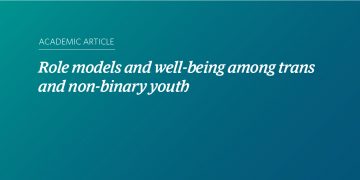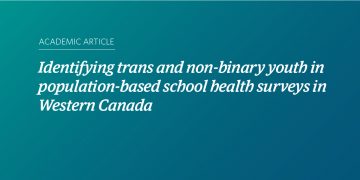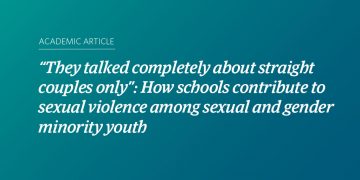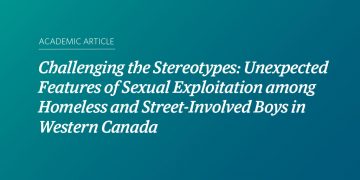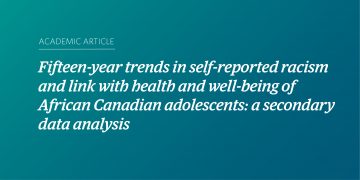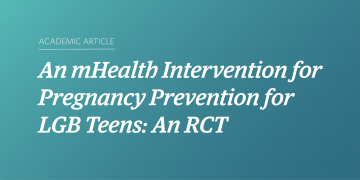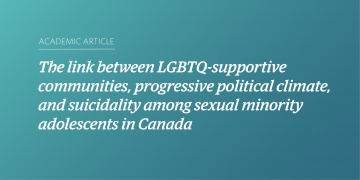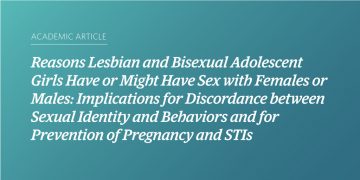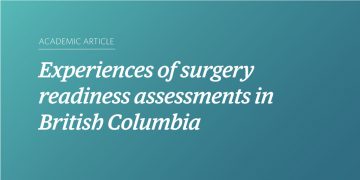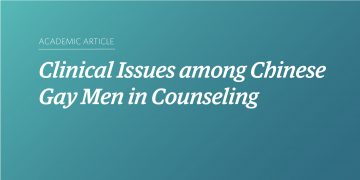Role models and well-being among trans and non-binary youth
Abstract Background It is important for young people to see themselves represented in stories, on television and in different job opportunities, so they can have an awareness of what is possible. While we often hear the words “representation matters,” research on how representation affects health outcomes of trans and non-binary (TNB) youth is lacking. In […]
Identifying trans and non-binary youth in population-based school health surveys in Western Canada
Abstract Background Most research about gender-diverse adolescents is with clinical samples, skewing population estimates of health and risk. With trans youth estimated at around 0.5% of the population and no reliable measures, school health surveys have not asked gender diversity items. In 2018, the British Columbia Adolescent Health Survey (BCAHS) in Canada trialled measures to […]
“They talked completely about straight couples only”: How schools contribute to sexual violence among sexual and gender minority youth
This study examined contextual factors shaping sexual violence victimisation and perpetration among sexual and gender minority youth, with school playing a key role. Based on qualitative data from semi-structured interviews with 50 young people aged 14–26 years who self-reported sexual violence perpetration in the Growing Up with Media survey, the analysis demonstrates how schooling’s ‘hidden curriculum’ leaves sexual and gender minority youth ill-equipped to navigate the world of sexuality.
Challenging the Stereotypes: Unexpected Features of Sexual Exploitation among Homeless and Street-Involved Boys in Western Canada
Research about the sexual exploitation of homeless and street-involved boys is limited and often combined with that of girls. As aggregation can distort unique issues among genders which are exploited, this study provides information about the context of exploitation for homeless boys.
Fifteen-year trends in self-reported racism and link with health and well-being of African Canadian adolescents: a secondary data analysis
We assessed the prevalence and trends in racial discrimination among African Canadian adolescents in British Columbia. The association between racial discrimination and self-rated health, access to mental health services, substance use, suicidal thoughts and attempts, experience of extreme stress, among others were examined within the 2018 dataset.
An mHealth Intervention for Pregnancy Prevention for LGB Teens: An RCT
Although lesbian, gay, bisexual and other sexual minority (LGB+) girls are more likely than heterosexual girls to be pregnant during adolescence, relevant pregnancy prevention programming is lacking. Girl2Girl appears to be associated with increases in pregnancy preventive behaviors for LGB+ girls, at least in the short-term. Comprehensive text messaging–based interventions could be used more widely to promote adolescent sexual health behaviors across the United States.
The link between LGBTQ-supportive communities, progressive political climate, and suicidality among sexual minority adolescents in Canada
Despite supportive structural changes to reduce stigma towards lesbian, gay, and bisexual, transgender, queer, and questioning (LGBTQ) Canadian residents, sexual minority youth still face disparities compared to heterosexual peers. We aimed to characterize LGBTQ-supportive environments and political climates, and examine their links to suicidal behavior among sexual minority adolescents in western Canada.
Reasons Lesbian and Bisexual Adolescent Girls Have or Might Have Sex with Females or Males: Implications for Discordance between Sexual Identity and Behaviors and for Prevention of Pregnancy and STIs
We examined reasons lesbian and bisexual adolescent girls have sex or, if sexually inexperienced, might have sex with girls or boys, and the role of internalized homonegativity in these relations and among lesbians.
Experiences of surgery readiness assessments in British Columbia
This paper foregrounds patient experiences with surgery readiness assessments to discuss the tensions, challenges and opportunities they generate. The narratives demonstrate how much variation exists among people’s experiences of readiness assessments for gender-affirming surgery.
Clinical Issues among Chinese Gay Men in Counseling
In Chinese societies, such as those in Taiwan, Hong Kong, mainland China, Malaysia, and Singapore, same-sex sexual behaviors have been pathologized, resulting in increased minority stress among Chinese gay men (CGM). Therefore, we attempted to understand CGM’s potential clinical issues. Twelve CGM were interviewed and a basic interpretive qualitative methodology was used to analyze the […]
